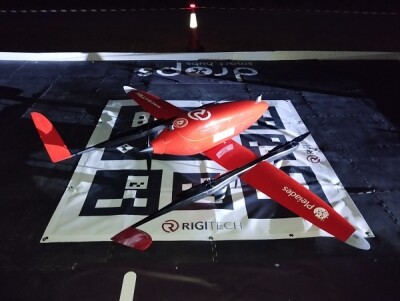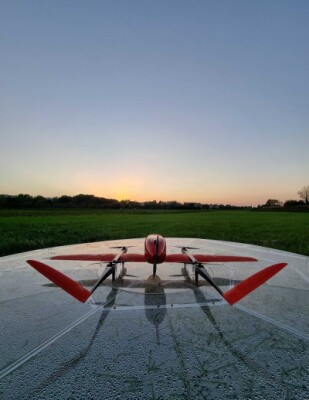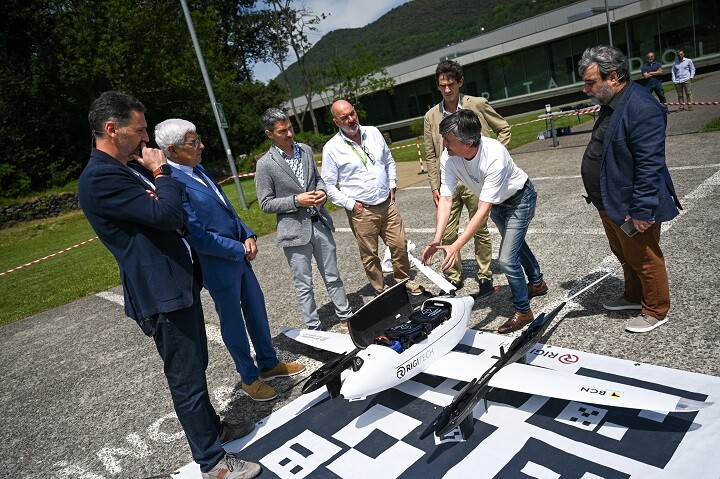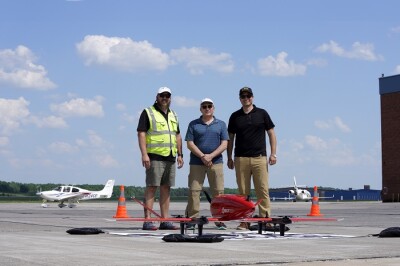What business models work best for drone companies seeking to compete with traditional ground transportation methods like long-distance trucks, last-mile bikes, and scooters? What is the most effective way to integrate B2B and B2C drone delivery services? How does the regulatory environment affect logistics and planning?
These are just a few of the questions facing companies involved in drone logistics. For Switzerland-based RigiTech, the key to answering these questions lies in the creation of fully integrated drone delivery systems.
“Our drones are designed with a network-first mentality,” David Rovira, Co-Founder & CBO of RigiTech, told Commercial UAV News. “A network-first mentality is the key to scaling drone delivery into a sustainable business model.”
 Founded in 2018, his drone logistics solutions company offers centralized RigiCloud software infrastructure to ensure reliable, compliant communications, flight tracking, and fleet maintenance management. In addition, RigiTech’s drone systems have been approved for and flown BVLOS operations on five continents. With this approval, RigiTech delivers essential goods in their home base in Switzerland, but also across Europe, Asia, Oceania, North and South America, with a focus on healthcare, offshore, and postal markets.
Founded in 2018, his drone logistics solutions company offers centralized RigiCloud software infrastructure to ensure reliable, compliant communications, flight tracking, and fleet maintenance management. In addition, RigiTech’s drone systems have been approved for and flown BVLOS operations on five continents. With this approval, RigiTech delivers essential goods in their home base in Switzerland, but also across Europe, Asia, Oceania, North and South America, with a focus on healthcare, offshore, and postal markets.
Commercial UAV News spoke with Rovira to learn more about RigiTech’s approach to drone logistics implementation.
Commercial UAV News: What are the major challenges in integrating B2B and B2C delivery services?
With the market still in its early stages, rapid scaling is essential to prove the viability of the economic model. As an OEM, we prioritize delivering the safest technology able to fly BVLOS in the maximum number of routes while keeping the costs down. This enables our customers to scale effectively by providing delivery services at the right place, the right time, and at the right cost.
Rovira: We believe that it will not be a question of drone-based vs ground based but that both models will coexist and complement each other. The drone-based business model excels in remote areas, mountains, and islands where traditional transportation may be inefficient or where currently there is a need to change vehicles to reach the destination such as cars and boats. RigiTech’s approach leverages the Eiger drone’s capabilities to reduce delivery times and costs in these regions, making drone delivery a competitive alternative to ground methods in these scenarios.
Rovira: We recognize that drones are an integral part of the aviation industry, where safety and compliance are paramount. As drone regulations begin to take shape, we’re encouraged by the significant efforts from Civil Aviation Authorities to integrate drones into the airspace. The drone delivery industry is actively raising the bar in safety and compliance through close collaboration with regulatory bodies. The main challenge lies in aligning the rapid growth of startups with the evolving pace of regulatory development in this emerging industry.
 Rovira: Collaborative airspace management” requires coordination among various stakeholders, including drone operators, air traffic control, and regulatory bodies, to establish standards and communication protocols for safe drone integration into existing airspace systems. The FAA is leading the way in this integration, and we are excited to see such rapid progress in this area.
Rovira: Collaborative airspace management” requires coordination among various stakeholders, including drone operators, air traffic control, and regulatory bodies, to establish standards and communication protocols for safe drone integration into existing airspace systems. The FAA is leading the way in this integration, and we are excited to see such rapid progress in this area.
Rovira: Public acceptance is key to the widespread adoption of delivery drones. Concerns about privacy, safety, and noise need to be addressed through transparency, education, and demonstrations of the benefits of drone technology. Engaging with communities and stakeholders to build trust is essential.
Rovira: RigiTech is focused on expanding our presence in the healthcare sector across various geographies while exploring new markets. Our upcoming projects will prioritize increasing safety and enabling new scenarios for deploying our drones, ensuring we meet the growing demand with innovative and reliable solutions.















Comments